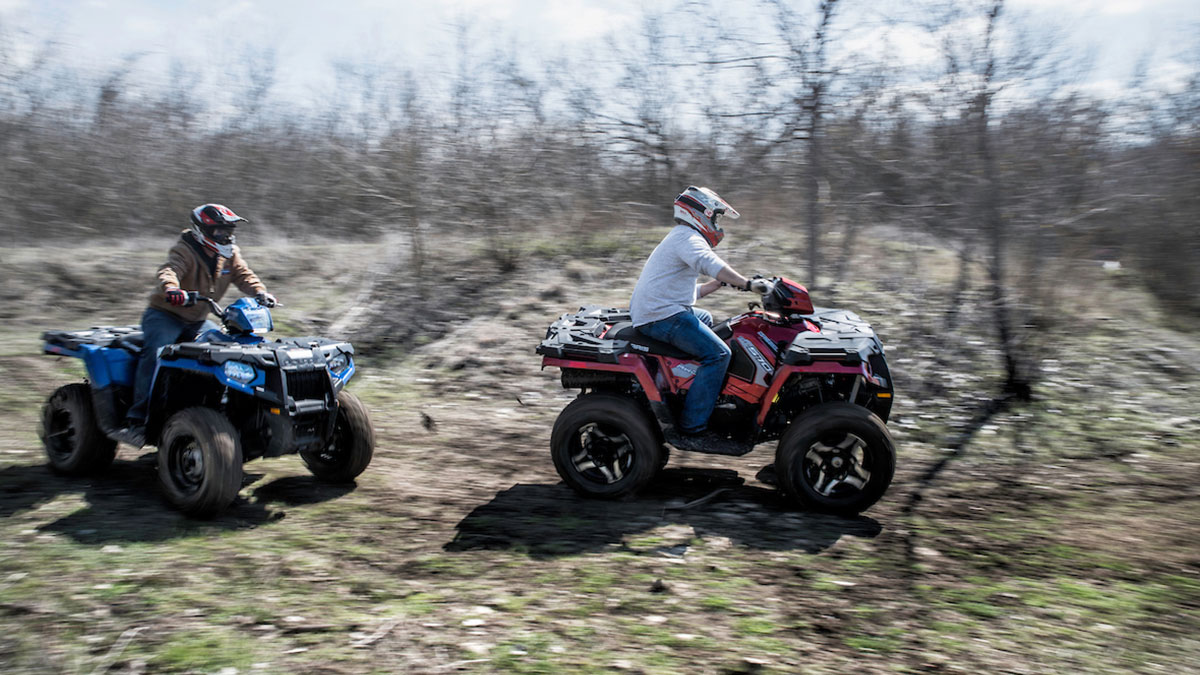Discover the Open Air with Our Leading ATV Adventures
Wiki Article
ATV Riding Techniques: Grasping the Art of Off-Roading

Body Positioning
To efficiently browse with challenging off-road terrain, it is crucial for ATV motorcyclists to consistently keep appropriate body placing. Maintaining the proper body position while riding an ATV not just improves control and security however additionally makes sure the rider's safety and security. By embracing the correct body positioning strategies, bikers can properly disperse their weight, improve their equilibrium, and minimize the risk of crashes or injuries.One secret element of correct body placing is maintaining the feet on the foot pegs. Placing the feet on the foot pegs enables the motorcyclist to keep security and control over the ATV. The rider's knees should be a little bent, giving a minor suspension to soak up shocks and keep balance. Furthermore, the motorcyclist's top body must continue to be loosened up and flexible, enabling quick and seamless activities when required. This includes keeping a light grip on the handlebars to maintain control without too much pressure.
Additionally, the biker's eyes should constantly be focused in advance, scanning the terrain and anticipating any kind of barriers or modifications in the path. By preserving an ahead gaze, cyclists can make instant decisions and respond appropriately to challenging surface.
Throttle Control
Building upon the importance of correct body placing for ATV riders, mastering throttle control is a critical ability that allows riders to properly navigate via various off-road surfaces. Throttle control describes the capability to regulate the amount of power supplied to the ATV's engine. By comprehending how to control the throttle, bikers can make certain a controlled and smooth velocity, enabling them to browse obstacles with accuracy.Abrupt or jerky activities can trigger the ATV to shed grip or come to be unstable, making it challenging to preserve control. This strategy allows the ATV to maintain a stable speed and gives far better grip, decreasing the danger of crashes.
Along with smooth modulation, bikers should likewise learn just how to stabilize the throttle with various other riding techniques, such as body positioning and braking. When climbing up high hillsides, riders need to use adequate throttle to keep momentum without subduing the ATV or triggering wheel spin. Likewise, when descending steep inclines, bikers ought to use the throttle in combination with correct body placing and stopping to maintain control and prevent the ATV from gliding or toppling.

Braking Strategies
A necessary aspect of ATV riding strategies is understanding effective stopping methods. Understanding exactly how to brake effectively can make a substantial difference in your safety and control over the automobile when it comes to off-roading. One of the most essential braking methods is utilizing the front brake greater than the rear brake. The front brake provides the bulk of the stopping power, so it is essential to utilize it sensibly. It is essential to remember that extreme stopping with just the my response front brake can trigger the ATV to pitch ahead, potentially leading to loss of control or even turning over. As a result, it is advised to use both brakes all at once, yet with even more pressure on the front brake. An additional vital method is to prevent locking the wheels while stopping. Securing the wheels can lead to skidding, making it challenging to maintain control. To prevent this, press the brake levers gradually and launch them somewhat if you feel the wheels securing. By grasping these stopping methods, you can improve your ATV riding skills and make certain a pleasurable and secure off-roading experience.Cornering Methods
One important facet of grasping ATV riding techniques is recognizing effective cornering methods. Cornering on an ATV can be difficult, yet with the best strategies, bikers can browse turns safely and effectively. The trick to successful cornering is to maintain control of the ATV while optimizing grip and reducing the threat of toppling.To perform a correct cornering method, riders ought to come close to the turn at an appropriate speed, ensuring they are not going too sluggish or also rapid. It is important to change the body weight towards the inside of the turn, leaning into it to preserve equilibrium and security. This aids to counterbalance the centrifugal pressure and maintains the ATV upright.
In addition, cyclists should keep their eyes focused on the exit factor of the turn rather than the prompt path in advance (ATV). This permits for smoother and extra specific steering, as it helps the biker expect any type of challenges or adjustments in surface
In addition, correct throttle control plays a significant role in cornering. Riders should regulate the throttle smoothly, preventing unexpected accelerations or decelerations, which can cause loss of control.
Uphill and Downhill Riding
When browsing off-road terrain, ATV bikers have special info to understand the methods for uphill and downhill riding to keep control and guarantee safety and security. Downhill riding, on the other hand, needs motorcyclists to lean back and shift their weight in the direction of the back of the ATV. By mastering the methods for uphill and downhill riding, ATV motorcyclists can with confidence tackle various off-road surfaces and enjoy a electrifying and secure adventure.Final Thought
In verdict, grasping the art of ATV riding needs a mix of body positioning, throttle control, stopping strategies, and effective cornering. Uphill and downhill riding also require details abilities to navigate safely. By carrying out these strategies, cyclists can boost their off-roading experience and boost their total control and safety and security on the ATV.ATV Riding Techniques: Mastering the Art of Off-Roading is an extensive guide that delves into the ins and outs of understanding the abilities required for off-road ATV riding. Whether you are a beginner or an experienced cyclist, ATV Riding Techniques: Mastering the Art of Off-Roading supplies indispensable advice to help boost your off-road ATV riding abilities to the following level.

Report this wiki page